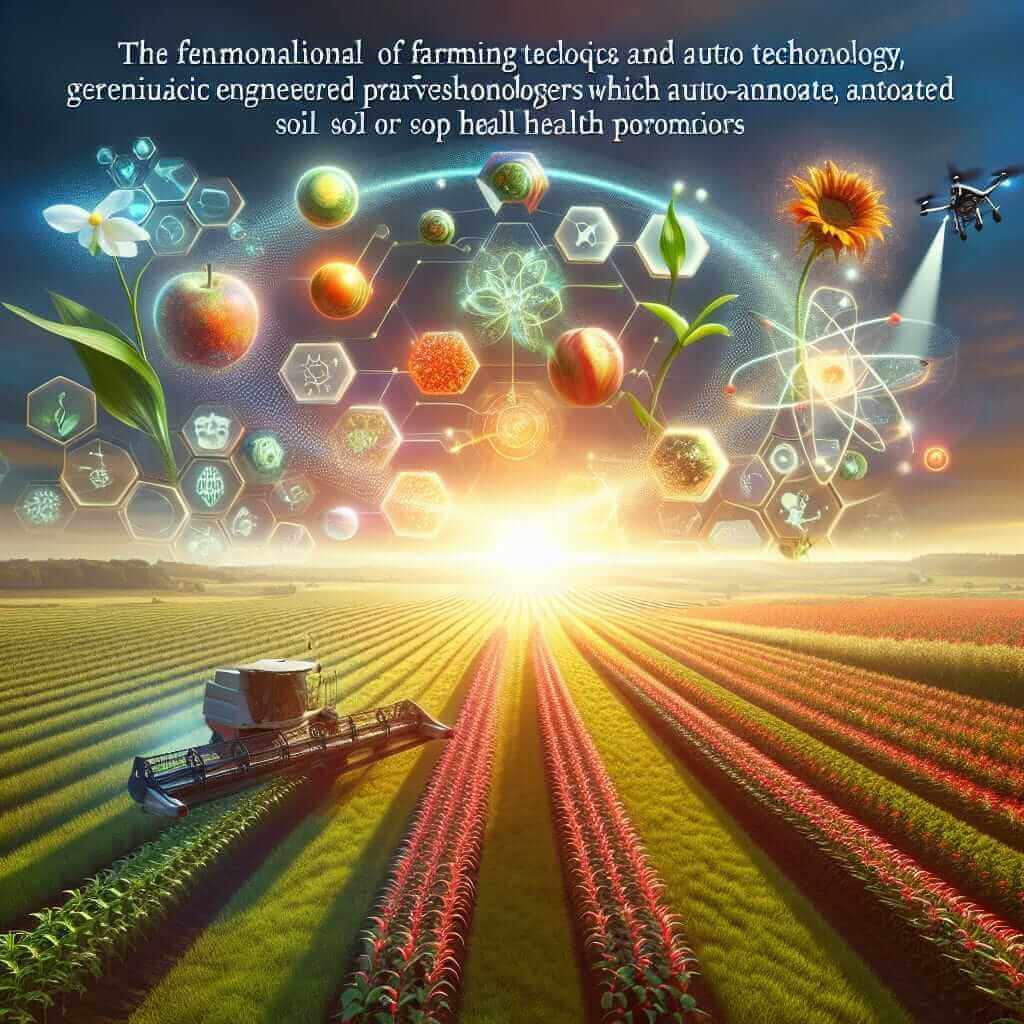The IELTS Reading test is designed to assess a wide range of reading skills, including reading for gist, reading for main ideas, reading for detail, skimming, understanding logical argument, and recognizing writers’ opinions, attitudes, and purpose. Given the dynamic nature of technological advancements, topics like biotechnology in agriculture are prevalent and likely to reappear in future exams due to their ongoing relevance and significance.
In this article, we will explore how advancements in biotechnology are impacting agricultural practices. We will provide a comprehensive IELTS Reading practice test, complete with questions, answers, explanations, and essential vocabulary and grammar tips to help you improve your performance.
IELTS Reading Practice Test
Passage: How Advancements in Biotechnology Are Shaping Agricultural Practices
Biotechnology has revolutionized agriculture, altering the way crops are cultivated and livestock is raised. One of the significant advancements is the development of genetically modified organisms (GMOs). These organisms have been engineered to possess traits that enhance resistance to pests, improve nutritional content, and increase yield.
The use of GMOs is controversial. Proponents argue that GMOs help to meet the food demands of a growing global population by producing more resilient crop varieties. Critics, however, raise concerns regarding environmental impacts, biodiversity loss, and potential health risks.
Additionally, biotechnology has facilitated precision farming, which involves the use of GPS, IoT sensors, and data analytics to optimize field-level management concerning crop farming. These technologies ensure efficient utilization of resources, such as water and fertilizers, while minimizing environmental impact.
Another transformative aspect of biotechnology in agriculture is the development of bio-pesticides and bio-fertilizers. Unlike chemical counterparts, bio-pesticides are derived from natural materials and microorganisms, offering an eco-friendly alternative. Moreover, bio-fertilizers enrich the soil by enhancing microbial activity, hence improving plant growth sustainably.
Biotechnology extends beyond crops to livestock. Advances in genetic engineering have led to the development of disease-resistant animal breeds, which significantly reduces the reliance on antibiotics. This approach not only improves animal welfare but also mitigates the risk of antibiotic resistance, a serious public health issue.
Despite the numerous benefits, the adoption of biotechnology in agriculture faces several challenges, including regulatory barriers, ethical concerns, and public skepticism. Continued research and transparent communication are essential to address these challenges and harness the full potential of biotechnology to create sustainable agricultural practices.
IELTS Reading Questions
Multiple Choice
-
What is one of the main benefits of GMOs according to proponents?
- A. They improve biodiversity.
- B. They have no health risks.
- C. They help meet global food demands.
-
What aspect of biotechnology helps in optimizing resource utilization in farming?
- A. Genetic engineering.
- B. Precision farming.
- C. Bio-pesticides.
True/False/Not Given
- Proponents of GMOs argue that GMOs decrease the reliance on chemical fertilizers. ( )
- Bio-pesticides are considered an environmentally friendly alternative to chemical pesticides. ( )
- Regulatory barriers are not a concern for the adoption of biotechnology in agriculture. ( )
Matching Headings
- Match the following headings with the appropriate paragraph:
- i. Controversies Surrounding GMOs
- ii. Biotechnology in Animal Husbandry
- iii. The Role of Precision Farming
Answer Key and Explanations
-
C. Proponents argue that GMOs help to meet the food demands of a growing global population.
- Explanation: This is directly mentioned in the passage.
-
B. Precision farming.
- Explanation: Precision farming involves using technology to optimize resource use in farming.
-
True. Proponents of GMOs argue that GMOs decrease the reliance on chemical fertilizers.
- Explanation: The passage states that genetically engineered crops help improve nutritional content and increase yield, indirectly suggesting reduced reliance on chemical inputs.
-
True. Bio-pesticides are derived from natural materials and considered environmentally friendly.
- Explanation: This is explicitly mentioned in the passage.
-
False. Regulatory barriers are a concern for the adoption of biotechnology.
- Explanation: The passage lists regulatory barriers as a challenge.
-
- i. Controversies Surrounding GMOs: Paragraph 2
- ii. Biotechnology in Animal Husbandry: Paragraph 6
- iii. The Role of Precision Farming: Paragraph 4
Lessons Learned
Common Mistakes
- Misreading Key Information: Ensure you read questions and texts thoroughly to avoid missing key information.
- Overlooking Synonyms and Paraphrasing: Understand that IELTS often uses synonyms or rephrased content in questions.
- Time Management: Practice allocating time efficiently to answer all questions within the given time.
Vocabulary
- Genetically Modified Organism (noun) /ˈdʒenəˌtikli ˈmɒdɪfaɪd ˈɔːɡənɪzəm/: An organism whose genetic material has been artificially manipulated.
- Precision Farming (noun) /prɪˈsɪʒən ˈfɑːmɪŋ/: An agricultural approach that utilizes technology to optimize field-level management.
- Bio-pesticide (noun) /ˈbaɪoʊ ˈpɛstɪsaɪd/: A pesticide derived from natural materials.
Grammar
- Passive Voice: Emphasizing the action rather than the subject.
- Example: “Biotechnology has been utilized to create more resilient crops.”
- Relative Clauses: Providing additional information about a noun.
- Example: “Crops that are genetically modified tend to have higher yields.”
Recommendations
Practice Tips
- Regular Practice: Regularly practice reading passages and questions under timed conditions.
- Use of Authentic Materials: Utilize authentic IELTS practice tests and reputable sources for study material.
- Building Vocabulary: Focus on expanding your academic vocabulary related to common IELTS topics.
- Answer Review: Always review your answers and understand your mistakes to improve.
By diligently following these tips and consistently practicing, you can enhance your reading skills and achieve a high score in the IELTS Reading section.

By employing these strategies and understanding the significance of advancements in biotechnology on agricultural practices, you can better prepare for the IELTS Reading section and improve your chances of achieving a higher score. Happy studying!